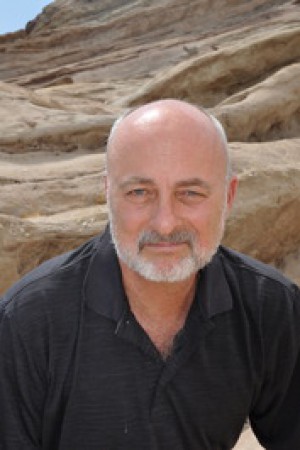David Brin is a scientist, public speaker and world-known author. His novels have been New York Times Bestsellers, winning multiple Hugo, Nebula and other awards. At least a dozen have been translated into more than twenty languages.David's latest novel - Existence - is set forty years ahead, in...
show more
David Brin is a scientist, public speaker and world-known author. His novels have been New York Times Bestsellers, winning multiple Hugo, Nebula and other awards. At least a dozen have been translated into more than twenty languages.David's latest novel - Existence - is set forty years ahead, in a near future when human survival seems to teeter along not just on one tightrope, but dozens, with as many hopeful trends and breakthroughs as dangers... a world we already see ahead. Only one day an astronaut snares a small, crystalline object from space. It appears to contain a message, even visitors within. Peeling back layer after layer of motives and secrets may offer opportunities, or deadly peril. David's non-fiction book -- The Transparent Society: Will Technology Make Us Choose Between Freedom and Privacy? -- deals with secrecy in the modern world. It won the Freedom of Speech Award from the American Library Association. A 1998 movie, directed by Kevin Costner, was loosely based on his post-apocalyptic novel, The Postman. Brin's 1989 ecological thriller - Earth - foreshadowed global warming, cyberwarfare and near-future trends such as the World Wide Web. David's novel Kiln People has been called a book of ideas disguised as a fast-moving and fun noir detective story, set in a future when new technology enables people to physically be in more than two places at once. A hardcover graphic novel The Life Eaters explored alternate outcomes to WWII, winning nominations and high praise.David's science fictional Uplift Universe explores a future when humans genetically engineer higher animals like dolphins to become equal members of our civilization. These include the award-winning Startide Rising, The Uplift War, Brightness Reef, Infinity's Shore and Heaven's Reach. He also recently tied up the loose ends left behind by the late Isaac Asimov: Foundation's Triumph brings to a grand finale Asimov's famed Foundation Universe.Brin serves on advisory committees dealing with subjects as diverse as national defense and homeland security, astronomy and space exploration, SETI and nanotechnology, future/prediction and philanthropy.As a public speaker, Brin shares unique insights -- serious and humorous -- about ways that changing technology may affect our future lives. He appears frequently on TV, including several episodes of "The Universe" and History Channel's "Life After People." He also was a regular cast member on "The ArciTECHS." Brin's scientific work covers an eclectic range of topics, from astronautics, astronomy, and optics to alternative dispute resolution and the role of neoteny in human evolution. His Ph.D in Physics from UCSD - the University of California at San Diego (the lab of nobelist Hannes Alfven) - followed a masters in optics and an undergraduate degree in astrophysics from Caltech. He was a postdoctoral fellow at the California Space Institute. His technical patents directly confront some of the faults of old-fashioned screen-based interaction, aiming to improve the way human beings converse online. Brin lives in San Diego County with his wife and three children.You can follow David Brin:Website: http://www.davidbrin.com/Blog: http://davidbrin.blogspot.com/Twitter: http://twitter.com/DavidBrinYouTube: http://www.youtube.com/user/cab801
show less

